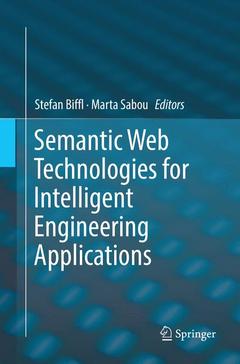Semantic Web Technologies for Intelligent Engineering Applications, Softcover reprint of the original 1st ed. 2016
Coordonnateurs : Biffl Stefan, Sabou Marta

This is the first book to explore how Semantic Web technologies (SWTs) can be used to create intelligent engineering applications (IEAs). Technology-specific chapters reflect the state of the art in relevant SWTs and offer guidelines on how they can be applied in multi-disciplinary engineering settings characteristic of engineering production systems. In addition, a selection of case studies from various engineering domains demonstrate how SWTs can be used to create IEAs that enable, for example, defect detection or constraint checking.
Part I ?Background and Requirements of Industrie 4.0 for Semantic Web Solutions? provides the background information needed to understand the book and addresses questions concerning the semantic challenges and requirements of Industrie 4.0, and which key SWT capabilities may be suitable for implementing engineering applications. In turn, Part II ?Semantic Web-Enabled Data Integration in Multi-Disciplinary Engineering? focuses on how SWTs can be used for data integration in heterogeneous, multi-disciplinary engineering settings typically encountered in the creation of flexible production systems. Part III ?Creating Intelligent Applications for Multi-Disciplinary Engineering? demonstrates how the integrated engineering data can be used to support the creation of IEAs, while Part IV ?Related and Emerging Trends in the Use of Semantic Web in Engineering? presents an overview of the broader spectrum of approaches that make use of SWTs to support engineering settings. A final chapter then rounds out the book with an assessment of the strengths, weaknesses and compatibilities of SWTs and an outlook on future opportunities for applying SWTs to create IEAs in flexible industrial production systems.
This book seeks to build a bridge between two communities: industrial production on one hand and Semantic Web on the other. Accordingly, stakeholders from both communities should find this book useful in their work. Semantic Web researchers will gain a better understanding of the challenges and requirements of the industrial production domain, offering them guidance in the development of new technologies and solutions for this important application area. In turn, engineers and managers from engineering domains will arrive at a firmer grasp of the benefits and limitations of using SWTs, helping them to select and adopt appropriate SWTs more effectively. In addition, researchers and students interested in industrial production-related issues will gain valuable insights into how and to what extent SWTs can help to address those issues.
Part I: Background and Requirements of Industrie 4.0 for Semantic Web Solutions.- Part II: Semantic Web Enabled Data Integration in Multi-Disciplinary Engineering.- Part III: Intelligent Applications for Multi-Disciplinary Engineering.- Part IV: Related and Emerging Trends in the use of Semantic Web in Engineering.
About the Editors:
Marta Sabou is Senior Researcher at the Vienna University of Technology, where she leads a group of researchers in the area of semantic representation and integration of engineering data in the context of automation systems. She has a broad expertise in several Semantic Web research topics ranging from ontology engineering tasks (ontology creation, mapping, modularization) to the creation of intelligent systems that benefit from semantic information in domains as varied as tourism, climate change or open government. Her current interest is on data integration issues, with a special focus on the domain of industrial automation and Industrie 4.0.
Stefan Biffl is Associate Professor of Software Engineering at the Institute of Software Technology and Interactive Systems, Vienna University of Technology. He is the head of the Christian Doppler research laboratory “Software Engineering Integration for Flexible Automation Systems”, which investigates concepts, methods, and tools for improving production systems engineering processes based on better integration of data in multi-disciplinary engineering projects. Stefan Biffl is also a supervisor in the doctoral college on "Cyber-Physical Production Systems" at the Vienna University of Technology. His current research interests include software and systems engineering, and product and process improvement.
The first book to cover the topic of using Semantic Web technologies to create intelligent engineering applications
Reflects the state of the art in relevant Semantic Web technologies and offers guidelines on how they can be applied in multi-disciplinary engineering settings
Includes case studies from various engineering domains to demonstrate how Semantic Web technologies can be employed to create intelligent engineering applications
Includes supplementary material: sn.pub/extras
Date de parution : 06-2018
Ouvrage de 405 p.
15.5x23.5 cm
Disponible chez l'éditeur (délai d'approvisionnement : 15 jours).
Prix indicatif 105,49 €
Ajouter au panierDate de parution : 11-2016
Ouvrage de 405 p.
15.5x23.5 cm
Disponible chez l'éditeur (délai d'approvisionnement : 15 jours).
Prix indicatif 147,69 €
Ajouter au panier


